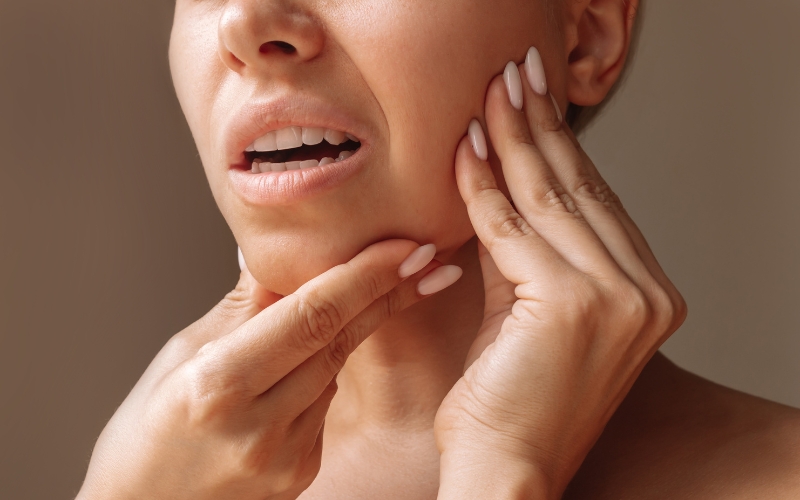New Patients Welcome!

Jaw pain can be a troubling and often confusing experience. One common but less frequently discussed cause of jaw pain is cavities. While most people know that cavities can cause toothaches, the link between cavities and jaw pain is less well-known.
Jaw pain from cavities occurs when the decay reaches the inner layers of the tooth, affecting the nerves, or when an infection develops, leading to inflammation that can spread to the jaw. This article will explain the underlying mechanisms of this pain, how to recognize it and provide practical advice for dealing with it.
How Cavities Develop
Cavities form when the enamel, the hard outer layer of your teeth, is damaged by acids produced by bacteria in your mouth. These bacteria feed on sugars from the food and drinks you consume, producing acid as a byproduct. This acid can erode the enamel over time, leading to the formation of cavities.
Stages of Cavity Development:
- Initial Demineralization: Acid begins to erode the enamel, creating weak spots.
- Enamel Decay: Continued acid exposure breaks down the enamel, forming a cavity.
- Dentin Decay: The cavity progresses to the dentin, the layer beneath the enamel, causing increased sensitivity and pain.
- Pulp Damage: If decay reaches the pulp, the innermost part of the tooth containing nerves and blood vessels, it can cause severe pain and infection.
How Cavities Cause Jaw Pain
Cavities can cause jaw pain when they reach the inner layers of the tooth. The pulp, which houses the tooth’s nerves, becomes inflamed and infected, leading to a condition called pulpitis. If the infection spreads, it can create an abscess, a painful pocket of pus that can cause swelling and pain extending to the jaw.
Mechanisms Behind Jaw Pain from Cavities:
Jaw pain from cavities is not uncommon and can be quite distressing. The discomfort often stems from several underlying issues caused by the cavity. Here are some key mechanisms behind this pain:
- Nerve Inflammation: When the nerves within a tooth become inflamed, the resulting pain can radiate to the jaw, creating a throbbing or sharp sensation.
- Abscess Formation: The development of an abscess can lead to swelling and increased pressure, which often translates to jaw pain.
- Referred Pain: Due to the proximity of nerves, pain from an infected tooth can be felt in the jaw, a phenomenon known as referred pain.
- Muscle Tension: Persistent tooth pain can cause the muscles in your jaw to tense up, leading to additional discomfort and jaw stiffness.
Recognizing the Symptoms
Identifying the symptoms of a cavity that may be causing jaw pain is crucial for timely treatment. Here are some signs to watch for:
Symptoms of a Cavity:
- Tooth Sensitivity: Increased sensitivity to hot, cold, or sweet foods and drinks.
- Toothache: Persistent pain in the affected tooth.
- Visible Holes or Pits: Noticeable signs of decay on the tooth surface.
- Discoloration: White, brown, or black spots on the tooth.
Symptoms of Jaw Pain from a Cavity:
- Radiating Pain: Pain that starts in the tooth and extends to the jaw.
- Swelling: Swelling around the affected tooth or in the jaw.
- Tenderness: Tenderness when touching the jaw or chewing.
- Ear Pain: Occasionally, the pain can radiate to the ear on the same side as the affected tooth.
Practical Tips for Managing Jaw Pain from Cavities
If you’re experiencing jaw pain that you suspect is related to a cavity, it’s important to address both the pain and the underlying dental issue. Here are some practical tips:
Immediate Relief:
- Over-the-Counter Pain Relief: Non-prescription pain relievers like ibuprofen can help reduce pain and inflammation.
- Cold Compress: Apply a cold compress to the outside of your jaw to reduce swelling and numb the pain.
- Saltwater Rinse: Rinse your mouth with warm salt water to help reduce inflammation and clean the affected area.
- Avoid Trigger Foods: Stay away from foods and drinks that can exacerbate the pain, such as very hot, cold, or sugary items.
Long-Term Solutions:
- Visit a Dentist: Schedule an appointment with your dentist Seattle, WA as soon as possible to address the cavity and prevent further complications.
- Maintain Oral Hygiene: Brush and floss regularly to prevent the formation of new cavities and maintain overall dental health.
- Dietary Changes: Reduce your intake of sugary and starchy foods that contribute to cavity formation.
- Regular Checkups: Regular dental checkups can help detect and treat cavities before they cause significant pain or complications.
Prevention Strategies
Preventing cavities is the best way to avoid the pain and complications associated with them. Here are some effective prevention strategies:
Good Oral Hygiene Practices:
- Brushing: Brush your teeth at least twice a day with fluoride toothpaste. Make sure to brush all surfaces of your teeth and along the gumline.
- Flossing: Floss daily to remove plaque and food particles between your teeth that your toothbrush can’t reach.
- Mouthwash: Use an antibacterial mouthwash to help reduce plaque and bacteria in your mouth.
Dietary Tips:
- Limit Sugary Foods and Drinks: Sugary foods and drinks contribute to the formation of cavities. Try to limit their consumption and opt for healthier alternatives.
- Healthy Snacks: Choose snacks like fruits, vegetables, and nuts over sugary or starchy snacks.
- Stay Hydrated: Drinking water helps wash away food particles and bacteria and keeps your mouth moist, which is essential for oral health.
Regular Dental Visits:
- Routine Checkups: Visit dental practice regularly for checkups and cleanings. This allows your dentist to detect any early signs of cavities and other dental issues.
- Professional Cleanings: Regular professional cleanings remove plaque and tartar buildup that can’t be removed by brushing and flossing alone.
- Dental Sealants: Ask your dentist about dental sealants, a protective coating applied to the chewing surfaces of the back teeth to prevent cavities.
Understanding Gum Disease and Jaw Pain
While cavities are a common cause of jaw pain, gum disease can also contribute to discomfort in the jaw. Gum disease, or periodontal disease, is an infection of the gums that can lead to tooth loss and other serious health problems if left untreated.
How Gum Disease Develops:
- Plaque Buildup: Plaque is a sticky film of bacteria that forms on your teeth. If not removed by brushing and flossing, it can harden into tartar, which can only be removed by a dentist.
- Gingivitis: The earliest stage of gum disease, gingivitis, is characterized by red, swollen gums that bleed easily.
- Periodontitis: If gingivitis is not treated, it can progress to periodontitis, a more serious form of gum disease. This stage involves the formation of pockets between the teeth and gums, which can become infected.
Symptoms of Gum Disease:
- Bleeding Gums: Gums that bleed easily, especially when brushing or flossing.
- Swollen Gums: Red, swollen gums that may be tender to the touch.
- Receding Gums: Gums that have pulled away from the teeth, making the teeth look longer.
- Persistent Bad Breath: Bad breath that doesn’t go away even after brushing and using mouthwash.
- Loose Teeth: Teeth that feel loose or shifting.
Managing and Preventing Gum Disease
Preventing and managing gum disease involves good oral hygiene practices and regular dental care. Here are some tips:
Good Oral Hygiene:
- Brush and Floss Regularly: Brush your teeth at least twice a day and floss daily to remove plaque and prevent gum disease.
- Use Antibacterial Mouthwash: An antibacterial mouthwash can help reduce plaque and bacteria in your mouth.
- Proper Technique: Use a soft-bristled toothbrush and gentle circular motions to brush your teeth and gums without irritating them.
Jaw pain can be distressing, often linked to cavities and gum disease. Understanding this connection is vital for managing and preventing discomfort. Good oral hygiene, regular dental visits, and the practical tips in this blog can help protect your dental health and avoid pain.
If you suspect your jaw pain is related to a cavity or gum disease, don’t hesitate to seek professional care. Early intervention prevents serious complications and keeps your mouth healthy.




